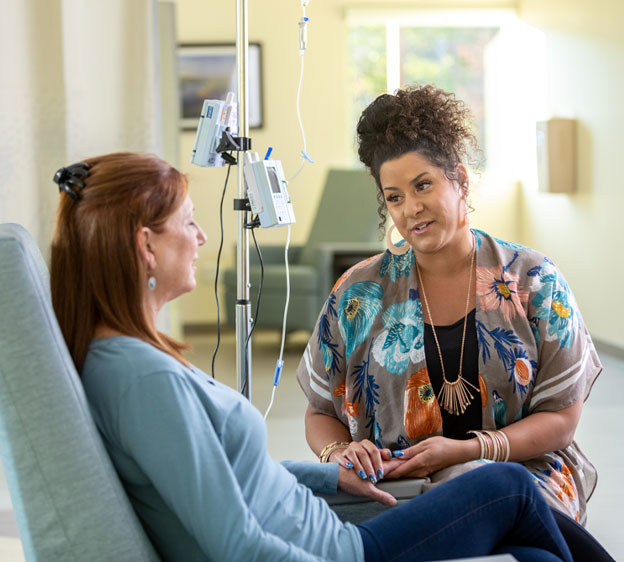
After receiving a cancer diagnosis, everything feels unpredictable. That’s when a cancer nurse navigator can help. These specially trained nurses guide you through every step of treatment, recovery and more.
“Patients with cancer are more than a medical diagnosis,” says Colonel J. Mark Hennigan, director of oncology services at Beaufort Memorial. “They’re all individuals and deserve personalized attention and care. That’s what cancer nurse navigators provide.”
Read More: Cancer Care Close to Home
What Does a Cancer Care Navigator Do?
The role of a cancer nurse navigator is to help eliminate barriers to cancer care and manage the physical, emotional and financial stress of a cancer diagnosis. They coordinate appointments, educate patients about a cancer diagnosis and related treatments, and create a plan for survivorship once treatment ends.
Read More: Becoming a Cancer Survivor
At Beaufort Memorial, we have different types of cancer care navigators:
- Oncology nurse navigators handle many of the tasks mentioned above, offering supportive care and addressing your needs throughout treatment and beyond. Our program includes additional navigators who are dedicated to assisting patients with breast cancer.
- Oncology research nurses connect you with clinical trials that offer new forms of treatment. They’ll educate you about your options for trials and explain the qualifications, risks and benefits.
- Oncology social workers help you work through challenges during your journey and connect you with community resources. They provide counseling sessions to manage stress, anxiety, fears, family dynamics and other emotional components of cancer, and facilitate monthly support groups to connect you with others affected by cancer. In addition, they can help arrange transportation to and from appointments, coordinate with your medical team to complete medical leave paperwork and connect you to financial resources and other valuable community services.
- Oncology financial navigators provide financial and medical bill counseling to help you manage the financial aspects of your care. They can connect you to community resources for household expenses, programs to assist with the cost of treatment and help you apply for financial assistance programs if needed.
“Nurse navigators are here to help patients and their families focus on overcoming cancer,” Colonel Hennigan says. “Our goal is to manage the finer details of care to minimize their stress. Patient navigators can also arrange care more quickly, and when patients receive the care they need sooner, they may have better results from treatment.”
Read More: Alicia Wynn: Sometimes It Takes a Village
What Makes a Good Patient Navigator?
With a diverse knowledge of treatment options and available support systems, cancer nurse navigators understand each patient’s needs are different. A good navigator can pinpoint your or your loved one’s biggest challenges after a diagnosis, whether it’s a language barrier, transportation issue or complex treatment plan.
A nurse navigator also serves as your first point of contact after a cancer diagnosis, so he or she will connect you to doctors at the hospital as well as those outside the cancer center, such as your primary care provider. You’ll want a navigator who is easy to reach and communicates well.
Meet our team of cancer nurse navigators and find a cancer care specialist for yourself or a loved one.
